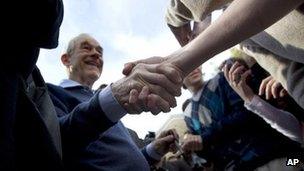The 76-year-old's youth vote
- Published
- comments

Congressman Paul garners many of his supporters from a digitally-native generation
Charleston, South Carolina - The garden of Charleston College, external, bathed in South Carolina's winter sunshine, surrounded by trees and ponds, is a calming sort of place.
But as the Texas Congressman Ron Paul takes to the open air stage there is an air of anticipation and excitement.
"The spirit of liberty is alive and well in Charleston!" he says.
Students are perched on the high wall to get a better view. For this college crowd he's a star, a truth teller. The man who at 76, is old enough to be their great grandfather, is for some the man of the moment.
Among the audience there are committed supporters and others just curious because of the buzz.
"My brother talks about him all the time and he's so jealous I am here, so it's pretty cool," says one student. Her friend adds: "It's cool that he takes ideas from both sides."
A first year student who had come undecided leaves committed.
"It's my first political rally," the student says. "He is going to bring it back to America, the way it was. I like that. He gives everything with a zinger. He's my man."
One student with a Ron Paul banner says he has taken the time to read all about Mr Paul's ideas.
"He will save our generation from debt," he says. "He straight up says if we don't cut our debt, cut our bases, bring our troops back, our generation will have no money, we'll end up paying all the debt back."
I doubt that Ron Paul will be the story of the night when South Carolina votes on Saturday.
Tailoring his message
He's certainly not the story of the day, with Perry dropping out, Newt's ex-wife going public and the Iowa result being over-turned.
But something's going on. And it is probably more important in the long run than these tidbits exciting the media for 24 hours.
Ron Paul has been around the block a few times, external. He has long pushed his obsessions with the gold standard, external and his determination to radically scale back big government.
Libertarianism has long been a strand in American politics. Ron Paul even stood as the Libertarian Party presidential candidate once.
So what is happening to make him popular right now, I ask the one of the university's professors of political science, external?
"It is fascinating, I see it all the time in the class room," Kendra Stewart says. "College students really being attracted to a candidate who is tailoring his message to them. Telling them they don't want to be left holding the bag for the money their parents and grand parents are spending. "
"Right now in the United States there's a lot of disenchantment with government. There always is, but we are seeing high levels of it, higher than almost anytime since Watergate.
"His anti-government approach, his rhetoric about shrinking government is very appealing, especially to young people who see things in Washington as a total mess."
Combining left and right
One of the things that may make him popular with the young is the way he combines hard right economic policy with some social concerns more often found on the left.
He opposes not just the Iraq war, but much of America's military presence overseas.
He declares the war on drugs has failed, and condemns various post 9/11 measures like the Patriot Act as incompatible with the rights of the citizen and civil liberties.
The danger for him is that the lines that appeal to the young, turn off older republicans who might otherwise support him. They like his economics but not his foreign policy.
Conservative talk radio pundit Jack Hunter who writes as the Southern Avenger, external told me the establishment just doesn't get it.
"He agrees with most Americans," Mr Hunter says. "If you look at the polls most Americans don't want to do what America has been doing for the last ten to fifteen around the world, policing the world, nation building, they want to cut our debt which requires not doing as much around the world."
But I repeat that makes some Republicans distrust him.
"This is a confusing time for Republicans. They look at what they want in terms of cutting government but they don't look at what we are spending overseas. $1.4 trillion a year. If our deficit is 1.5 trillion, you do the math."
With his speech over and questions answered, Ron Paul tries to leave. But he is mobbed by young people wanting his autograph.
I ask him why he thinks they support him.
"They like freedom," he replies.
A student leans over into my microphone.
"I'll tell you why. He is the only one who is realistic about fiscal issues. He's the only one we can trust, everything else from the other candidates is posturing or lies or empty platitudes."
"He's just given a speech grounded in logic, sound philosophical principles, sound economics. No one else comes close."
Despite this level of praise it is highly unlikely Ron Paul will win his party's nomination. If he doesn't, he could still stand as an independent.
In a country widely disillusioned with mainstream politics and a message both radical and traditional, he might have a better chance.